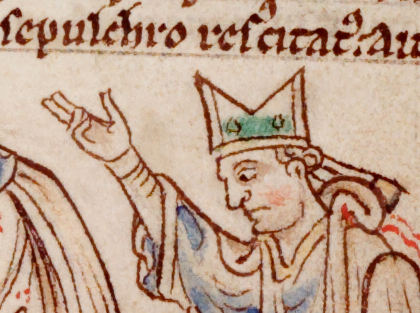
Parker Library 16, fol. 182r, by permission of the
Master and Fellows of Corpus Christi College, Cambridge.
Why There is No Singing in Heaven
William says: "But there is a question about whether there will be choruses, or ring dances, and gesticulations in that state of glory."And the words of the wise who have gone before us among Christian people partly seem to aggravate the problem and make it more difficult, since they are found to have clearly [affirmed] that there will be. Nature itself and the experience of natural things seem to insinuate, in fact seem to testify, as much. For human beings do not sustain [even] the modest joys of the present state without moving their bodies and almost [all] their particular members. For it is obvious to you how the joy arising in your soul moves your mouth, and the motion called laughter changes your whole face."
Singing and Dancing in Heaven?
Christian literature is filled with descriptions of the angels and saints singing in heaven in praise of God. For example:
- In the Gospel of Luke angels sang at Christmas announcing the birth of Christ to the shepherds.
- In Isaiah the prophet Seraphim sing to God in heaven, ďHoly, holy, holy.Ē
- In the Book of Revelation 5:9 and 15:3 there is more singing in heaven.
William admits that the words of the wise among the Christian people have made the question more difficult, since he is going to deny that there is any singing and dancing in heaven.
William notes that laughter and such exuberant motions as dancing and jumping around come naturally to human beings when they experience joy. Moreover, William claims that many men and women cannot restrain themselves from bodily motions, such as clapping, keeping rhythm with their feet or hands, or dancing when they hear music they like. Do you agree? Do you find yourself doing this?
Yet William is opposed to admitting that singing and dancing exist in heaven. He claims that true and spiritual joys do not cause such motions. He does admit that bodily joys, which are not true joys, cause such motions. William has a very spiritual concept of what a human being is and even denies that the body is part of a human being in his Concerning the soul (De anima). Rather, the body is a tool or instrument that a human being uses.
But what does he mean by non-bodily joys? Can you give examples of any? Williamís claim that true joy is something austere makes one wonder about what his abbey was like. Does he sound like a fun guy?
Wait a minute - Some Objections (and Replies)
William does raise some possible objections.
First, since it is most fitting that the creator be praised vocally as well as mentally, God ought to be praised by heart and tongue in heaven. Second, gratitude to the creator would not seem to be complete unless it bursts forth in words of praise, blessings, and glorification of the creator.
A possible reply to these first two objections might be that vocal praise is needed only on account of the imperfection of human hearers who depend upon words to learn of the thoughts and feelings of others. But such ignorance will cease in heaven -- hence, there will be no reason for vocal praise when human beings are totally transparent to one another and to God.
A third objection might be that a big part of the happiness of heaven will be removed if harmony and music are removed from heaven. In reply William warns that someone defending such music in heaven is verging on a concept of heaven like that found in the Qur'an ![]() .
.
Logical Conclusions
Williamís emphasis on the spirituality of human beings led him not only to exclude bodily pleasures from heaven, but also to exclude bodily punishment from hell. Still, one wonders why he did not interpret the description of paradise in the Qur'an non-literally as he did the Gospelís words about the fires of hell.